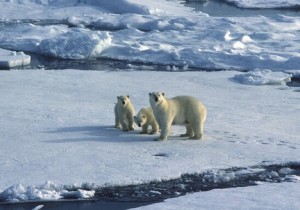 There’s a wonderful letter (PDF) in Science signed by 255 members of the National Academy of Sciences. It’s titled “Climate Change and the Integrity of Science,” and it’s not simply about climate change. It argues that politically motivated attacks on climate change threaten the very integrity of science.
There’s a wonderful letter (PDF) in Science signed by 255 members of the National Academy of Sciences. It’s titled “Climate Change and the Integrity of Science,” and it’s not simply about climate change. It argues that politically motivated attacks on climate change threaten the very integrity of science.
As the lead signer points out, since it’s unusual to get 255 scientists to agree on anything, the endorsement of this statement by so many scientists is important and significant.
Here are some excerpts that address political issues and the attacks on scientific integrity:
We are deeply disturbed by the recent escalation of political assaults on scientists in general and on climate scientists in particular. All citizens should understand some basic scientific facts. There is always some uncertainty associated with scientific conclusions; science never absolutely proves anything. When someone says that society should wait until scientists are absolutely certain before taking any action, it is the same as saying society should never take action. For a problem as potentially catastrophic as climate change, taking no action poses a dangerous risk for our planet. …
Many recent assaults on climate science and, more disturbingly, on climate scientists by climate change deniers, are typically driven by special interests or dogma, not by an honest effort to provide an alternative theory that credibly satisfies the evidence. …
We also call for an end to McCarthy- like threats of criminal prosecution against our colleagues based on innuendo and guilt by association, the harassment of scientists by politicians seeking distractions to avoid taking action, and the outright lies being spread about them. Society has two choices: we can ignore the science and hide our heads in the sand and hope we are lucky, or we can act in the public interest to reduce the threat of global climate change quickly and substantively.
It’s about time someone other than a columnist said this. I certainly hope this statement receives the wide publicity it deserves.
A nod to Thomas Kuhn
I especially enjoyed the Thomas Kuhn-like explanations of scientific history (emphasis added):
Like all human beings, scientists make mistakes, but the scientific process is designed to find and correct them. This process is inherently adversarial— scientists build reputations and gain recognition not only for supporting conventional wisdom, but even more so for demonstrating that the scientific consensus is wrong and that there is a better explanation. That’s what Galileo, Pasteur, Darwin, and Einstein did. But when some conclusions have been thoroughly and deeply tested, questioned, and examined, they gain the status of “well-established theories” and are often spoken of as “facts.”
For instance, there is compelling scientific evidence that our planet is about 4.5bn years old ((the theory of the origin of Earth), that our universe was born from a single event about 14bn years ago (the Big Bang theory), and that today’s organisms evolved from ones living in the past (the theory of evolution). Even as these are overwhelmingly accepted by the scientific community, fame still awaits anyone who could show these theories to be wrong. Climate change now falls into this category: there is compelling, comprehensive, and consistent objective evidence that humans are changing the climate in ways that threaten our societies and the ecosystems on which we depend.
The fundamental conclusions about climate change
Here is the climate change portion of the argument:
[T]here is nothing remotely identified in the recent events that changes the fundamental conclusions about climate change:
(i) The planet is warming due to increased concentrations of heat-trapping gases in our atmosphere. A snowy winter in Washington does not alter this fact.
(ii) Most of the increase in the concentration of these gases over the last century is due to human activities, especially the burning of fossil fuels and deforestation.
(iii) Natural causes always play a role in changing Earth’s climate, but are now being overwhelmed by human-induced changes.
(iv) Warming the planet will cause many other climatic patterns to change at speeds unprecedented in modern times, including increasing rates of sea-level rise and alterations in the hydrologic cycle. Rising concentrations of carbon dioxide are making the oceans more acidic.
(v) The combination of these complex climate changes threatens coastal communities and cities, our food and water supplies, marine and freshwater ecosystems, forests, high mountain environments, and far more.
I would like to have seen a more direct reference to the health consequences of climate change. I believe that’s something people can understand and relate to more immediately than simply talking about the environment.
There are people who don’t believe in evolution
Peter Gleick, the lead signer, concludes his comments on the letter with these words:
Are the climate deniers going to go away? No. Nothing will convince them, since science hasn’t. There are still people — a lot of people — who do not believe in evolution, or plate tectonics, or the Big Bang theory. But the longer that policymakers hesitate to act, the more the balance will shift to suffering. I believe that history will prove those delaying action to be dangerously wrong, at a time when it is urgent that society be courageously right.
Related posts:
Climate change: A few signs of legislative hope
Daily Dose: Climate change: How bad can it get
Doctors and the health crisis of global warming
Climate crisis. Health crisis. Same difference.
Global warming makes me sick
Climate change: Bad news for children’s health
Resources:
Photo: Problem Bear
Climate Change and the Integrity of Science, Science, May 7, 2010 (PDF)
Peter H. Gleick, Climate Change and the Integrity of Science, The Huffington Post, May 9, 2010
Joseph Romm, Experts rally to defense of climate science, Salon, May 7, 2010


Sorry, comments are closed for this post.